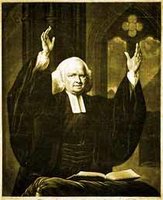I need all of you to stop what you're doing and listen.
 In the process of communication there are three main ingredients, the speaker, the message, and the receiver. In preaching, we're talking about the preacher, the sermon, and the congregation/Christian. Much in preaching class is done to improve the preacher and his message, but little thought is given to improving the listener.
In the process of communication there are three main ingredients, the speaker, the message, and the receiver. In preaching, we're talking about the preacher, the sermon, and the congregation/Christian. Much in preaching class is done to improve the preacher and his message, but little thought is given to improving the listener.I teach the importance of audience analysis. Knowing the audience and having a good relationship with it is of vital importance and among the chief concerns of the preacher. But, the preaching process would be greatly improved if the listener was better prepared as well for worship through the Word bring proclaimed.
 One of the greatest orators of all Christian history is George Whitefield (1714-1770). He is a fellow Oxford University (Pembroke College) alum who played a major role in the establishment of what we know as Methodism. He was instrumental in the spiritual revival in the Great Awakening and happened to have been one of the greatest orators of the faith.
One of the greatest orators of all Christian history is George Whitefield (1714-1770). He is a fellow Oxford University (Pembroke College) alum who played a major role in the establishment of what we know as Methodism. He was instrumental in the spiritual revival in the Great Awakening and happened to have been one of the greatest orators of the faith.But, we now to turn to his instructions for how one can best prepare himself/herself to get the most out of the sermon.
How to Listen to a Sermon
by George Whitefield
Keys for getting the most out of what the preacher says
Jesus said, 'Therefore consider carefully how you listen' (Luke 8:18). Here are some cautions and directions, in order to help you hear sermons with profit and advantage.
1. Come to hear them, not out of curiosity, but from a sincere desire to know and do your duty. To enter His house merely to have our ears entertained, and not our hearts reformed, must certainly be highly displeasing to the Most High God, as well as unprofitable to ourselves.
2. Give diligent heed to the things that are spoken from the Word of God. If an earthly king were to issue a royal proclamation, and the life or death of his subjects entirely depended on performing or not performing its conditions, how eager would they be to hear what those conditions were! And shall we not pay the same respect to the King of kings, and Lord of lords, and lend an attentive ear to His ministers, when they are declaring, in His name, how our pardon, peace, and happiness may be secured?
3. Do not entertain even the least prejudice against the minister. That was the reason Jesus Christ Himself could not do many mighty works, nor preach to any great effect among those of His own country; for they were offended at Him. Take heed therefore, and beware of entertaining any dislike against those whom the Holy Ghost has made overseers over you.
Consider that the clergy are men of like passions with yourselves. And though we should even hear a person teaching others to do what he has not learned himself, yet that is no reason for rejecting his doctrine. For ministers speak not in their own, but in Christ’s name. And we know who commanded the people to do whatever the scribes and Pharisees should say unto them, even though they did not do themselves what they said (see Matt. 23:1-3).
4. Be careful not to depend too much on a preacher, or think more highly of him than you ought to think. Preferring one teacher over another has often been of ill consequence to the church of God. It was a fault which the great Apostle of the Gentiles condemned in the Corinthians: 'For whereas one said, I am of Paul; another, I am of Apollos: are you not carnal, says he? For who is Paul, and who is Apollos, but instruments in God’s hands by whom you believed?' (1 Cor. 1:12; 2:3-5).
Are not all ministers sent forth to be ministering ambassadors to those who shall be heirs of salvation? And are they not all therefore greatly to be esteemed for their work’s sake?
5. Make particular application to your own hearts of everything that is delivered. When our Savior was discoursing at the last supper with His beloved disciples and foretold that one of them should betray Him, each of them immediately applied it to his own heart and said, 'Lord, is it I?' (Matt. 26:22).
Oh, that persons, in like manner, when preachers are dissuading from any sin or persuading to any duty, instead of crying, 'This was intended for such and such a one!' instead would turn their thoughts inwardly, and say, 'Lord, is it I?' How far more beneficial should we find discourses to be than now they generally are!
6. Pray to the Lord, before, during, and after every sermon, to endue the minister with power to speak, and to grant you a will and ability to put into practice what he shall show from the Book of God to be your duty.
No doubt it was this consideration that made St. Paul so earnestly entreat his beloved Ephesians to intercede with God for him: 'Praying always, with all manner of prayer and supplication in the Spirit, and for me also, that I may open my mouth with boldness, to make known the mysteries of the gospel' (Eph. 6:19-20). And if so great an apostle as St. Paul needed the prayers of his people, much more do those ministers who have only the ordinary gifts of the Holy Spirit.
If only all who hear me this day would seriously apply their hearts to practice what has now been told them! How ministers would see Satan, like lightning, fall from heaven, and people find the Word preached sharper than a two-edged sword and mighty, through God, to the pulling down of the devil’s strongholds!
 Clearly there are things each and every preacher can do to improve the preaching process, but what can you do on your end to make it more effective?
Clearly there are things each and every preacher can do to improve the preaching process, but what can you do on your end to make it more effective?The goal of all preaching and teaching is life change to the glory of God. That's what preachers should desire, to see change (affective, cognitive, and/or behavioral) to the glory of God, sanctification among the saints.
If that's going to happen, there have to be ears to hear. Ask God to help you. Ask God to give you clarity of thought for the sermon and any other reading of God's Word. Ask God to help you absorb the truths of the songs you sing so that you can respond rightly, worshiping in spirit and in truth. Ask God to keep you from those things that so easily distract during a service, especially during the preaching. Ask God for ears to hear, understand, and obey God's truth as it is communicated in the sermon.
For the preacher's sermon to be effective I need all of you to stop what
 you're doing and listen, for just as he preaches for the glory of God, so you must listen for the glory of God.
you're doing and listen, for just as he preaches for the glory of God, so you must listen for the glory of God.Preachers often say to each other, "It's Friday, but Sunday's coming." For us it's a great day of anticipation and impending consequence. We know in such a reminder that Sunday's coming and we need to be ready. What about you? When the sermon comes, will you be ready. It's Friday, but Sunday's coming.



3 Comments:
Thats a good one Gunny. I remember a preacher telling me once about vocabulary too. If they don't understand the words they won't understand the gospel. The most recent abrogation of this idea I've witnessed is a pastor using hermaneutic from the pulpit. "I don't know who this Herman Utic feller is but he needs to REPENT!"
Preach on!
Josh
Whitefield. Greatness!
Here's a little irony for you ...
Though a Baptist, my three greatest historical heros in Christian history ...
1. George Whitefield, a Methodist
2. Martin Luther, a Lutheran
3. Jonathan Edwards, a Congregationalist
I loves me some Spurgeon, but he doesn't quite make the medal round of the Gun olympics. In fact, he's in a close race for alternate with John Owen, another congregationalist. John Calvin, a Presbyterian, is also mixed in with this group, but there's a pretty significant gap for me between this second group and the medalists.
Just something relevant in the little world according to Gunny, I guess. ; )
Post a Comment
<< Home